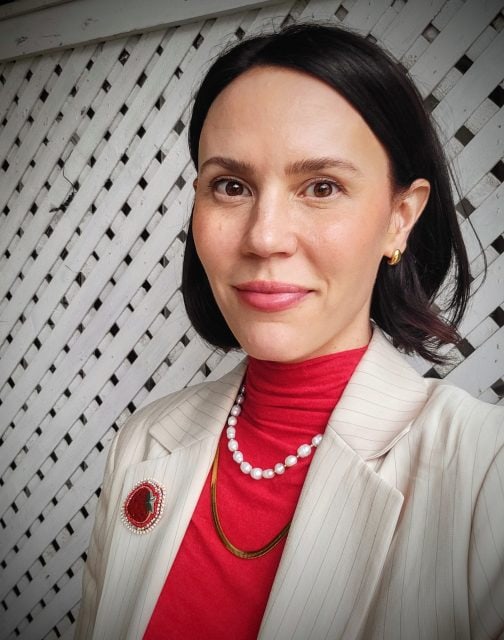It’s National Disability Employment Awareness Month. Do You Have a Supportive Workplace?
To kick off the final week of Disability Employment Awareness Month, Jessica Lea Fleming, director of Industry Development at the Canada Media Fund (CMF), shares her story and highlights the importance of the “A” in EDIA (“equity, diversity, inclusion and accessibility”).

Just over a year ago, I woke up excited about the day ahead, the first in a series of community consultations as part of my work as Director of Industry Development at the Canada Media Fund (CMF). It also happened to be my 41st birthday.
The ride to work was tumultuous; a historic downpour had led to flash flooding across Toronto. But I was more distracted by the nagging, familiar symptoms of a urinary tract infection (UTI).
There was too much good happening to let a summer storm or nuisance infection get in the way. Besides, I told myself, both would clear up in a matter of days.
Unfortunately, the storm flooded my basement, and the UTI was a harbinger of more serious health issues to come.
While a wet vac took care of the foot of water seeping into old tax returns and hand-me-downs tucked away for my growing child, the UTI persisted. Painful symptoms popped up with each new day. I saw my doctor almost weekly and consumed rounds of antibiotics. As someone diagnosed with endometriosis eight years ago, the anxiety of facing a drawn-out diagnostic process bubbled up. But I held out hope.
Over the coming months the situation got worse. My pelvic pain became unbearable and debilitating. Lightening-hot cramps ripped through me at the most inopportune moments. I began wearing old maternity tights as my stomach swelled unpredictably.
The list of specialists I saw grew longer — gynecologists, radiologists, nurses, physiotherapists and one very enthusiastic sound-bath healer who placed shimmering quartz crystals across my abdomen. I went for biopsies and bloodwork, test after invasive test. I was treated for pain, which left me lethargic and nauseous. I attended fewer work events and became increasingly isolated from friends and family.
While my health declined, my stress rose. Trying to stay on top of my work was exhausting. I was struggling to conceal my physical and emotional distress. One day my pain was so encompassing that I could not sit upright at my desk. The jig was up. It was time to come out to my employer.
The CMF is a leader in the audiovisual industry. We help to foster, finance and promote Canadian movies, TV, video games and online content. As part of the team focused on industry growth, it’s been my honour to build and support strategies such as our revamped EDIA plan. While most know EDI stands for equity, diversity and inclusion, that “A” is just as important. It stands for accessibility. The irony was not lost on me that, as a member of the team that advances inclusion and accessibility principles in the workplace, here I was, very much in need of those practices as I navigated a new disability.
Anyone who has been in a similar situation might be familiar with the feeling that, because of your disability, you’ve somehow failed. Though there are laws and legislation in place to protect workers’ rights in Canada, I was afraid my request for accommodation might affect my professional relationships or, worse, jeopardize my job security.
The reality is that at least 24 percent of working-age Canadians are disabled. Many of us will experience disability in our lifetimes, and the longer we live the more likely we are to experience age-related disabilities and complications to existing ones.
I am fortunate. My doctors and employer worked with me to identify what I could do when my symptoms were managed, and what we could do to adapt when I needed flexibility.
Was it a perfect process? Absolutely not, but the willingness to fumble, to refine, and to trust each other’s intentions is what distinguishes my accommodation experience from that of so many others. Those more difficult experiences explain why there’s still such resistance to letting one’s employers know what’s going on.
Many organizations say they’re willing to accommodate disabilities in the workplace, but how many truly adopt an approach that is patient, sincere, even enthusiastic?
While cement and a spade repaired the cracks in my basement, healing my body has been a longer process.
My diagnoses revealed worsened endometriosis, adenomyosis and circulatory complications. Thankfully, I now have a treatment plan in place. Despite the challenges, I continue to flourish professionally, in large part because the CMF had my back. A supportive employer allowed me to make the best decisions for my well-being without questioning if I was still a valued member of the team.
October is National Disability Employment Awareness Month. I hope that by sharing my experience, more decision-makers and employers will recognize that accommodation is more than a legal obligation, it’s a chance to cultivate trust.
We never know when a flash flood will change the course of a life, whether it’s a waterlogged home or a full-blown health crisis. A workplace that embraces accommodation builds dexterity and resilience. Through this process, teams not only weather the storm but can come out the other side invigorated and inspired, together.
To learn how to talk to your employer about accommodation, or about disability rights in Canada, check out disabilityrightscanada.ca.



